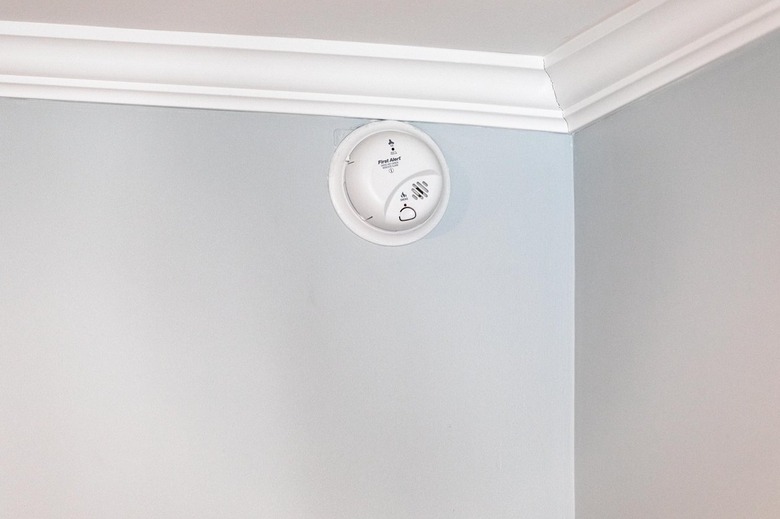5 Possible Reasons Why A Wired Smoke Alarm Is Going Off
We may receive a commission on purchases made from links.
Few things are more frustrating than being unable to relax at home because your smoke alarm's going off for no reason. Hard-wired smoke detectors do this less frequently than battery-operated models because although both may go off when their batteries start dying, hard-wired models get most of their power through your home's electrical grid, leaving their backup batteries with a reasonably long life expectancy. On the downside, hard-wired smoke alarms tend to be interconnected so that if one alarm sounds, all of the others go off automatically, meaning a false alarm will often sound out across your entire home.
Tip
A hard-wired smoke alarm could go off because of a dead backup battery, power surges, improper installation, dust in the air, or humidity.
1. Smoke Alarm Batteries Need Replacing
1. Smoke Alarm Batteries Need Replacing
Many wired smoke alarms will chirp or beep in short bursts periodically, and a low battery will trigger regular chirping until the batteries are replaced. Even though the alarm is hard-wired, it also uses a battery backup to make sure the alarm remains active in the event of a power outage. If the battery is not low but the device is chirping, the battery may be loose inside the compartment or not installed in the right way. Dirt inside the smoke alarm or on the alarm's grill may also set off chirping.
2. Electrical Power Surges
2. Electrical Power Surges
A change in the electrical current to the wired smoke alarm may cause the smoke alarm sound to go off when there is not smoke in the air. When the electricity in the home is cut off during a storm or other event, or if the electrical current spikes, the smoke alarm can go off, causing a false alarm. A loose wire in the smoke detector can also cause it to go off as the electrical current is cut off and then restored to the alarm.
3. Improper Alarm Installation
3. Improper Alarm Installation
Proper smoke alarm installation can prevent your system from going off when it shouldn't. The interconnect wire, which is usually colored orange, is for connecting smoke alarms together. When one alarm goes off, the other connected alarms will go off as well, alerting the entire household at once.
Grounding the interconnect wire will cause the alarm to chirp every five seconds until the problem is corrected. Connecting a series of smoke alarms with an incompatible device, including some smoke alarms, will also cause the alarms to chirp. Consult the directions that came with your alarms for a list of compatible devices.
4. Dusty HVAC Systems
4. Dusty HVAC Systems
Your furnace can set off wired smoke alarms when there is no fire, especially when you first turn on the furnace when the weather starts to turn cold. The oil that coats the different parts of the furnace, which is applied by the factory, can burn off when the furnace first fires up for the season, creating some smoke that blows out of the vents in the house. This smoke will set off the alarm.
Also, during the warmer months, dust and other debris will settle in the furnace, the heat ducts and on the vents in the house. When the furnace first turns on, the dust will kick up, triggering the alarm as the dust enters the sensor area.
5. The Alarm's Location
5. The Alarm's Location
Smoke alarms should not be installed in areas where false alarms are likely, such as near a cooking surface, since smoke likely will be created without a fire. Smoke alarms should also not be wired into the garage or an unfinished area of the house since dust and other debris present in the air will trigger the alarm. Fire alarms need to be located away from high-humidity areas like bathrooms and laundry rooms. The combination of humidity and smoke alarms can cause false alarms.
